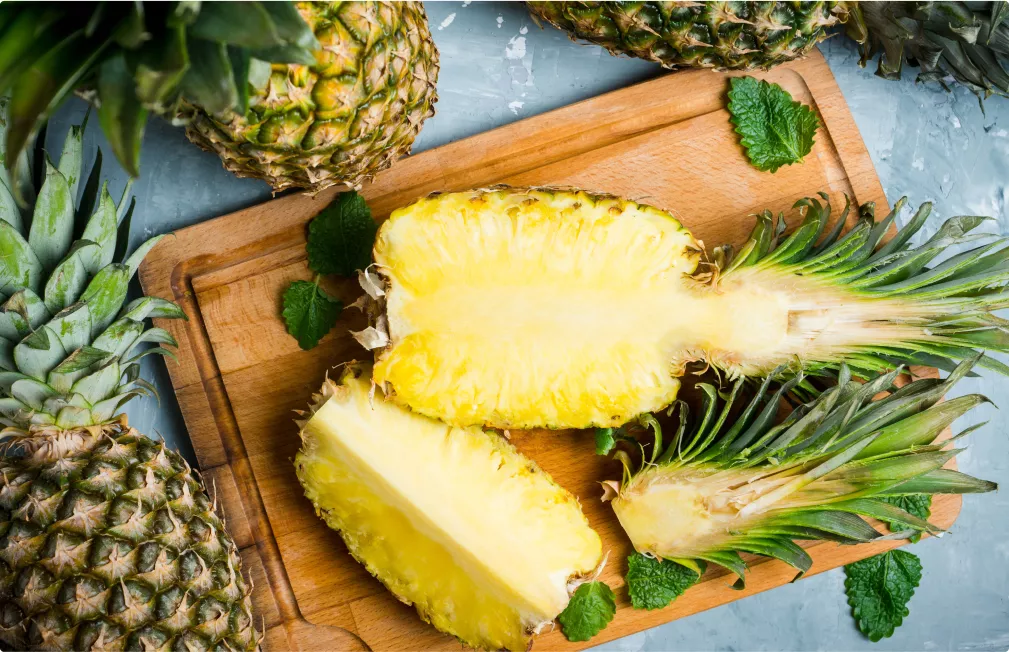Low in calories, diuretic and high in fibre, ideal for a healthy diet
Pineapple is a tropical fruit of the bromeliaceae family, and its scientific name is Ananas comosus.
Its shape is somewhere between oval and cylindrical, with a rough and scaly skin that can be of different shades, from light yellow to dark brown. Its pulp is yellow and juicy. It is also known for its plume or crown of green leaves.
Pineapples are a perennial plant that can reach up to a metre in height and they stand out for their long, pointed leaves.
It is one of the most popular fruits in cuisine and gastronomy.
Tasty and refreshing, with an intense aroma and a juicy texture, pineapples are delicious, diuretic and very healthy.
They are native to South America, where they were grown in the regions that are now Brazil, Paraguay and northern Argentina. It is believed that the indigenous people of these regions were the first to grow pineapples about 6,000 years ago. Later, in the 16th century, it was the Spaniards who brought pineapples to Europe, and since then they have been grown all over the world.
Today, pineapples are grown in many tropical and subtropical countries, but the main producers are Costa Rica, Brazil, the Philippines, Thailand, Hawaii and Mexico. These countries account for more than 80% of the world’s pineapple production.
It is a very interesting and engaging fruit. Here are some examples.
Pineapples are especially known for being an excellent source of vitamin C. This vitamin is essential to strengthen the immune system, contribute to the formation of collagen and promote skin health.
It also contains vitamin B6, which plays a crucial role in the metabolism of proteins and carbohydrates, as well as in the production of neurotransmitters.
In addition, it provides vitamin A in the form of beta-carotene, an antioxidant that is important for eye health, skin health and the proper functioning of the immune system.
Although in small proportion, it has vitamin E, which is a fat-soluble antioxidant that helps protect cells from oxidative damage.
Pineapple is a good source of manganese, a mineral necessary for the metabolism of carbohydrates, proteins and fats, as well as for the formation of bones and connective tissues.
It contains copper, which plays an important role in red blood cell production, iron metabolism and connective tissue formation.
It includes small amounts of iron, which is essential for the production of red blood cells and the transport of oxygen around the body.
It is a fruit that is rich in potassium, a mineral essential for fluid balance in the body, heart health and proper muscle functioning.
Pineapple is a low-calorie fruit and contains a moderate amount of natural sugars in the form of fructose.
On average, a serving of pineapple of about 100 grams contains about 50-60 calories. It is important to note that the size and ripeness of the fruit may slightly influence the caloric content.
Pineapples contain natural sugars in the form of fructose. A serving of pineapple of about 100 grams can contain about 10-12 grams of sugars.
They contain digestive enzymes, such as bromelain, which helps break down proteins in the body. In addition, they can help improve digestion and prevent constipation.
Bromelain in pineapples can help relieve inflammation and reduce pain in conditions such as arthritis and tendinitis.
Pineapples are generally safe for human consumption and may be toxic to some animals, such as dogs and cats. This is due to the enzymes it contains, which can cause digestive problems and other symptoms.
There are specific cases in which it could be contraindicated for people. As is the case of those who have some sensitivity or allergy. So if you experience symptoms such as itching, swelling of the lips or tongue, shortness of breath or rashes after consuming pineapple, it is important to consult a doctor.
If you have stomach ulcers, acid reflux, or digestive disorders, you may need to limit or avoid excessive pineapple consumption. This is because this fruit contains bromelain, a digestive enzyme that can cause stomach irritation in people who are especially sensitive.
In addition, pineapples contain natural acids that can be harmful to tooth enamel if consumed in excess. You should rinse your mouth with water after eating pineapple to help reduce this risk.
The high fibre content present in pineapples can have a laxative effect in some people. If you are prone to diarrhea problems or have a sensitive digestive system, you may need to moderate your intake.
Pineapples are just as delicious and healthy when they are sliced as when they are squeezed into juice. Its juice is also very popular as a flourish in cocktails such as Pina Colada.
It is a versatile fruit that can be used in a variety of recipes, from savoury dishes to desserts, including: pineapple and chicken skewers, shrimp and pineapple cocktails, pineapple and coconut cake and pineapple and banana smoothies.




